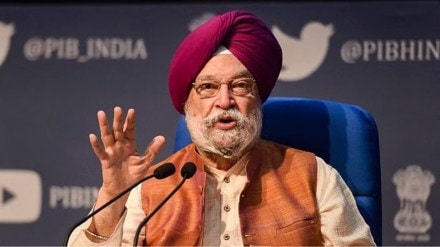Union Minister Hardeep Singh Puri has delivered a fiery retort to Pakistan People’s Party (PPP) leader Bilawal Bhutto Zardari over his “either our water will flow or their blood” jibe amid the suspension of the Indus Waters Treaty (IWT) brokered by the World Bank in 1960. The suspension of the IWT follows the Pahalgam terror attack that claimed the lives of 26 people.
The Minister of Petroleum and Natural Gas of India told ANI, “I heard his statement. Tell him to get his mental condition checked, what kind of statements he is giving. Enough is enough… Tell him to jump somewhere in water. Well, how will he when there will be no water? Do not dignify such statements. They will get to understand that.”
“They don’t know what has hit them. They’ll get to understand that,” he added.
#WATCH | Mohali: On Pakistan Peoples Party Chairman Bilawal Bhutto-Zardari's statement on the suspension of the Indus Water treaty, Union Minister Hardeep Singh Puri says, "Tell him to get his mental condition checked, what kind of statements he is giving. Enough is enough…Now… pic.twitter.com/jXUR9J4I5w
— ANI (@ANI) April 26, 2025
The minister’s mocking reply comes after Zardari took to social media to share pictures from a rally and wrote, “I want to send a clear message to India: the Indus River is ours and will remain ours. From this, either our water will flow through it, or their blood will.”
‘Pakistan will pay a heavy price’
“The Pahalgam incident is unequivocally a cross-border terrorist attack unleashed by a neighbouring state, and they are taking responsibility”, he further said and referred to the statement by Pakistan’s Defence Minister Khawaja Asif, who claimed that the country has been doing “dirty work” for the West.
Asif, in a TV interview, said, “Well, we have been doing this dirty work for the United States and West, including Britain, for 3 decades.” The statement was in response to the question about how the country supported and backed terrorist organisations in the past.
“They’ll have to pay a price for that. Unlike before, no business will continue. Like Prime Minister Modi said in Bihar, Pakistan will have to pay a heavy price, and this is just the beginning. The terrorists take away the most fundamental right, which is the right to life. Killing innocent people on the basis of their religion is highly condemnable. Not just every citizen of India is condemning it, but the entire world has joined us. All countries are condemning it. Pakistan is not just a rogue state, it is a country in terminal decline,” he added.
#WATCH | Mohali | On #Pahalgamterrorattack, Union Minister Hardeep Singh Puri says, "The Pahalgam incident is unequivocally a cross-border terrorist attack unleashed by a neighbouring state and they are taking its responsibility… Unlike before, no business will continue. Like… pic.twitter.com/IP6eGPIGIW
— ANI (@ANI) April 26, 2025
He also addressed the throat-slitting gesture of Pakistan Army Attache Taimur Rahat directed at Indians who were staging a protest outside the Pakistan embassy in London following the Pahalgam attack. Rahat made the gesture while holding the poster of IAF Wing Commander Abhinandan Varthaman.
“If a state descends on this level… This is a state-sponsored terrorism…. And the whole state has gone into terminal decline. Previous governments have had a very high tolerance, but we have reached a point where they will have to pay a price… If they (Pakistan) think that they can survive the suspension of the Indus Water Treaty, I wish them the best of luck…,” he said.
What is the Indus Waters Treaty?
Waters Treaty (IWT), signed between India and Pakistan on September 19, 1960, is a cross-border water cooperation brokered by the World Bank. The treaty was inked by India’s Prime Minister Jawaharlal Nehru and Pakistan’s President Ayub Khan after nearly a decade of negotiations.
As per the treaty, which has 12 Articles and 8 Annexures, the eastern rivers – Ravi, Beas, and Sutlej – were allocated to India, while the western rivers – Indus, Jhelum, and Chenab – were reserved for Pakistan. The treaty also sets out clear rules for water usage and dispute resolution.
IWT has no expiration date and no provision for unilateral withdrawal, and any dispute, should it arise, is to be addressed through Article IX. This article details a three-step resolution mechanism: first through the Permanent Indus Commission, then via a neutral expert, and finally, through a court of arbitration.
